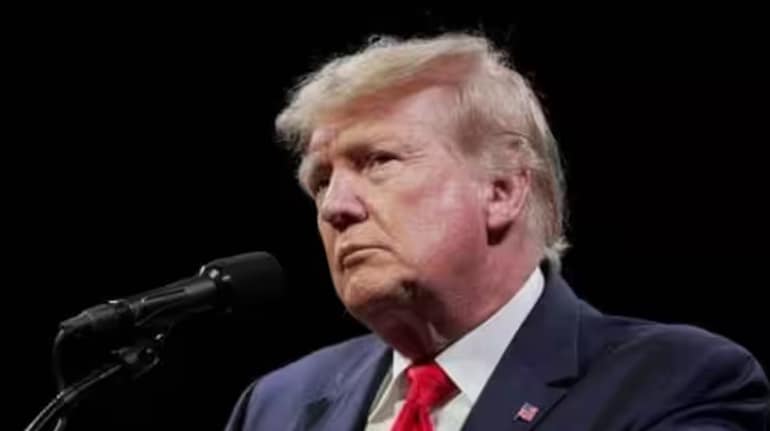



The shares of auto and IT companies dropped on July 7 as uncertainties around higher US tariffs and no trade deal yet continued to spook investors. The sharp fall in the share prices pushed the Nifty IT and Nifty Auto indices into the red, to hover around 39,004 and 23,949 respectively in the morning.
The 90-day pause to US President Donald Trump's higher tariffs is set to expire on July 9, and the elevated tariff rates will likely take effect from August 1. However, India and US are yet to announce their bilateral trade agreement.
Trump's 'Take in or leave it' tariff lettersTrump on July 5 announced that his government will be sending letters to 10 or 12 countries, outlining reciprocal tariff rates. Describing them as "take it or leave it" offers, Trump said the letters would be sent out on July 7. The rollout is expected to conclude by July 9, and the tariffs will kick in on August 1. "The money is going to come to the United States from August 1," Trump said while addressing reporters at Joint Base Andrews.
Indian Commerce Minister Piyush Goyal meanwhile said that India will not be rushed into any agreement based on external timelines. "India does not enter into any trade agreement based on deadlines. We will sign a deal with the US only when it is fully finalised, properly concluded, and in the national interest," Goyal told reporters.
Trump announces additional 10% tariff on BRICS nations:Meanwhile, Trump said during the weekend that he will impose an additional 10 percent tariff with no exceptions on any country aligning itself with what he called the "Anti-American policies of BRICS". This came as Prime Minister Narendra Modi addressed the summit.
In a joint statement, the BRICS members voiced "serious concerns about the rise of unilateral tariff" and noted that tariff risks are hurting the global economy.
India recently proposed retaliatory duties against the US at the World Trade Organization, saying Washington's 25 percent tariff on automobiles and some auto parts would affect $2.89 billion of India's exports. "India reserves the right to suspend concessions or other obligations ... that are substantially equivalent to the adverse effects of the measure to India's trade," the statement said.
The rising trade jitters and no trade deal as of yet put pressure on the export-oriented stocks, including those of auto companies. Maruti Suzuki shares dropped over 1 percent to trade at Rs 12,510 apiece, while those of Bharat Forge were down nearly 1 percent. Tata Motors shares were trading in the red with marginal losses.
IT companies derive a major portion of their revenue from the US economy. The uncertainties around tariffs has weakened the US dollar, which will likely bear an impact on the export-oriented IT stocks.
Tech Mahindra (TechM), Mphasis and HCL Tech shares dropped up to 2 percent. Infosys, Wipro, Persistent Systems and Tata Consultancy Services (TCS) shares were trading in the red with marginal losses.
"With the tariff deadline nearing, all eyes are on the anticipated US-India trade deal. Market participants remain optimistic about a favorable resolution, which could serve as a key catalyst for the next leg of the market’s upward trajectory," said Bajaj Broking.
As the clock ticks toward the much-anticipated India–US mini trade deal, the mood across Dalal Street is far from celebratory, said Harshal Dasani, Business Head, INVasset PMS. "Both Nifty Auto and Nifty IT indices slipped into the red in early trade, signalling investor caution around sectors directly exposed to Donald Trump’s latest tariff regime. With auto components facing a 25% duty under Section 232, and no fresh exemptions confirmed yet, the market seems to be bracing for a harsher reality if the deal misses the August 1 deadline," Dasani added.
"Unlike pharma, which remains tentatively insulated for now, the auto space has already taken the first hit. Companies like Bharat Forge, Motherson, and Tata Motors are staring at margin compression and possible demand deferrals from US OEMs. The bigger worry isn’t just the existing 25% duty but whether Trump’s “reciprocal tariff doctrine” leads to additional non-tariff barriers. For IT, fears stem from indirect exposure — delays in outsourcing decisions, potential visa restrictions, and a cloudier geopolitical landscape," he further said.
Disclaimer: The views and investment tips expressed by experts on Moneycontrol are their own and not those of the website or its management. Moneycontrol advises users to check with certified experts before taking any investment decisions.Discover the latest Business News, Sensex, and Nifty updates. Obtain Personal Finance insights, tax queries, and expert opinions on Moneycontrol or download the Moneycontrol App to stay updated!
Find the best of Al News in one place, specially curated for you every weekend.
Stay on top of the latest tech trends and biggest startup news.